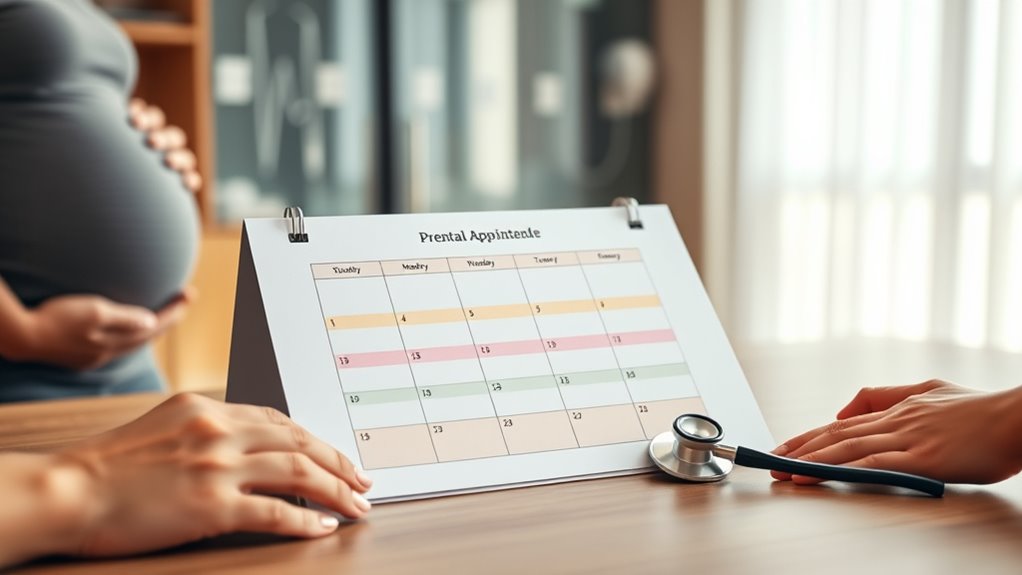Your prenatal appointment schedule typically includes monthly visits until 28 weeks, then biweekly until 36 weeks, and weekly as you approach delivery. During these check-ups, your healthcare provider monitors your blood pressure, measures your belly, listens to your baby’s heartbeat, and conducts tests. This routine helps catch issues early and keeps you informed about healthy pregnancy practices. Keep going to learn how to make the most of your appointments and stay healthy through pregnancy.
Key Takeaways
- Typical schedule includes monthly visits until 28 weeks, then biweekly until 36 weeks, and weekly until delivery.
- Prenatal appointments monitor blood pressure, fetal growth, and baby’s heartbeat to detect issues early.
- Regular check-ups provide personalized health advice, nutrition guidance, and screening tests.
- The schedule may be adjusted based on individual health needs or pregnancy complications.
- Additional visits may be scheduled if concerns or complications arise during pregnancy.

Are you wondering how often you should see your healthcare provider during pregnancy? Regular prenatal visits are essential to monitor your health and your baby’s development. Typically, you’ll start with a schedule that includes monthly appointments in the first 28 weeks, then every two weeks from 28 to 36 weeks, and weekly from 36 weeks until delivery. However, your provider may adjust this schedule based on your individual health needs or if any complications arise. These visits are more than just check-ins—they’re opportunities to ask questions, discuss nutrition tips, and refine your exercise routines to stay healthy throughout pregnancy.
During your appointments, your healthcare provider will check your blood pressure, measure your belly to track baby’s growth, and listen to your baby’s heartbeat. They may also perform blood tests, ultrasounds, and screenings to confirm everything is progressing smoothly. It’s imperative to keep these scheduled visits, as they help catch potential issues early, such as gestational diabetes or preeclampsia, so they can be managed promptly. Staying consistent with your appointments also allows your provider to give personalized advice on nutrition tips, such as increasing iron and calcium intake, and safe exercise routines to stay active without risking your health.
Regular check-ups help detect issues early and ensure personalized advice for a healthy pregnancy.
Speaking of exercise routines, your healthcare provider will likely offer recommendations tailored to your pregnancy. Staying active benefits both you and your baby, reducing discomfort, improving sleep, and preparing your body for labor. During these visits, your provider can suggest safe activities like walking, swimming, or prenatal yoga, and advise on what to avoid. They’ll also monitor how your body responds to these routines to prevent overexertion. As your pregnancy progresses, your exercise routine might need adjustments, and your provider can guide you on modifying activities to stay comfortable and safe.
Nutrition tips are another indispensable part of prenatal care discussions. Your healthcare provider will review your diet and may suggest supplements like prenatal vitamins to ensure you’re getting enough folic acid, iron, and other essential nutrients. They might also advise on avoiding certain foods that could be risky, such as unpasteurized dairy or undercooked meats. Regular check-ups give you a chance to update your nutrition tips based on your evolving needs and any symptoms you experience, like nausea or heartburn. Additionally, understanding the importance of vetted skincare products can help protect your skin from stretch marks and irritation during pregnancy.
Frequently Asked Questions
How Early in Pregnancy Should I Schedule My First Prenatal Visit?
You should schedule your first prenatal visit as soon as you suspect you’re pregnant, ideally by the 8th week. During this appointment, your doctor will discuss prenatal vitamins, emphasize healthy eating, and monitor your health. Early visits help ensure your baby’s proper development and address any concerns early on. Don’t wait—early care establishes a strong foundation for a healthy pregnancy, so contact your healthcare provider promptly once pregnancy is confirmed.
Are There Specific Tests Recommended at Each Appointment?
Your appointments are packed with important tests like ultrasound scans and blood tests that are vital for monitoring your baby’s development. At each visit, your healthcare provider may recommend specific assessments to check your health and your little one’s progress. These tests might include genetic screenings, glucose tests, or fetal growth scans, helping you stay informed and confident throughout your pregnancy journey. Every appointment feels like a milestone in your amazing adventure!
How Often Should I Expect to See My Healthcare Provider?
You should expect to see your healthcare provider every 4 weeks during your first 28 weeks, then every 2 weeks until 36 weeks, and weekly until delivery. During these visits, they’ll discuss your prenatal nutrition and pregnancy exercise routines, ensuring both you and your baby stay healthy. Regular appointments help monitor your progress, address concerns, and adjust your prenatal plan as needed for a smooth pregnancy journey.
What Should I Prepare for Each Prenatal Checkup?
Think of each checkup as tuning a delicate instrument; you should bring your prenatal nutrition journal, list of questions, and any concerns. Wear comfortable clothes for quick exams, and bring a list of your symptoms or changes. Expect to discuss your fetal development, diet, and lifestyle. Preparing ahead helps you stay in harmony with your body’s needs, ensuring your pregnancy melody remains smooth and joyful.
Can I Reschedule Appointments if I Feel Sick or Overwhelmed?
Yes, you can reschedule appointments if you’re feeling sick or overwhelmed. Contact your healthcare provider promptly to discuss your situation and follow the appointment rescheduling or sick visit protocol they provide. This guarantees you receive proper care while preventing the spread of illness. Your provider may suggest a virtual visit or a later date, so don’t hesitate to reach out and prioritize your health and your baby’s well-being.
Conclusion
Sticking to your prenatal appointment schedule guarantees you and your baby stay healthy and informed every step of the way. By keeping these visits, you can catch potential issues early and get the support you need. Are you ready to embrace this journey with confidence, knowing each appointment brings you closer to a healthy delivery? Remember, these moments are valuable investments in your baby’s future—so stay consistent and trust the process.









